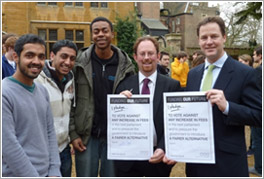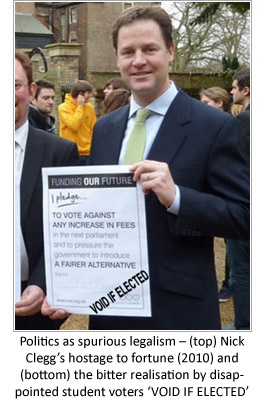MONTHLY BLOG 22, TO TRUST OR NOT TO TRUST?
If citing, please kindly acknowledge copyright © Penelope J. Corfield (2012)
When choosing Blog topics, I draw from my professional experiences as an academic historian and my grass-roots life as a long-term party activist and former Labour councillor. But today’s theme of Trust/or No trust comes from both fields of endeavour. Can society trust people? Should we? How do we balance between a lack of regulation, which may easily cloak fraud or incompetence, and an excess of petty regulations on individuals?
A culture of universal suspicion is bad for communal living. Trust is easy to lose, hard to build.
Ok, it seems clear that big institutions do need to be audited regularly. Their intricate structures and wide-ranging responsibilities are too difficult otherwise for outsiders to assess. Depressingly, the need for such inspection always seems to come from some scandalous incompetence or crime.
Nonetheless, society should not lurch from excessive under-regulation to excessive over-regulation, especially when it comes to institutions regulating the actions of their own staff. Then it seems that the culture of suspicion has just been imported in order to let superiors tyrannise those below them in their local hierarchy, without actually controlling those at the top. What about some due proportionality?
I have two immediate examples of attempts at petty regulation. The first was foiled. It came from the examinations department of an ancient University, where I was the external examiner a few years ago. We were abruptly informed that we had to tick every page of every script, as proof that we had actually read the essays which we were supposed to be marking. But the instruction was simultaneously offensive and utterly pointless. A tick would prove only that the page had been ticked, not that its contents had been duly read and considered.
Examiners may well feel a sense of exhaustion when confronting their annual tasks. But infantilising the teaching workforce by imposing distracting and pointless extra requirements is the reverse of helpful.
 Did the ancient University really lack trust in its own staff and its invited external examiner? In this case, common sense prevailed; and, after a protest, the instruction was withdrawn.
Did the ancient University really lack trust in its own staff and its invited external examiner? In this case, common sense prevailed; and, after a protest, the instruction was withdrawn.
This case was, however, all too typical of the excess rules (often imposed abruptly and later altered as abruptly) that try to stipulate how academics should do their jobs. The motive seems to be the urge for control by middle management – and the result is cynicism and secret evasion.
The second example has just come into my in-tray. It is a bright idea from the Labour Party, but it might come from any political organisation. The aim is to control/monitor those who stand for office (whether local, national or European) by asking them to sign a quasi-legal contract. Of course, it’s essential to let candidates to know what’s expected of them, in terms of attendance at meetings, responding to the electorate, managing publicity, canvassing and so forth. But signing a quasi-legal contract? Who is to monitor it? And who enforce it??
It’s the sort of politics as spurious-legalism that got Nick Clegg into so much trouble over his signed pledge (below) not to raise University tuition fees.

 Unfairness is written into the proposed contract from the start, by asking the elected members to attend a specified percentage of all public meetings in their constituencies. Those whose political patches contain many residents’ associations, neighbourhood watches, and other local gatherings will be required to jump over a much higher hurdle than those in sleepy Clochemerles, where nothing happens.
Unfairness is written into the proposed contract from the start, by asking the elected members to attend a specified percentage of all public meetings in their constituencies. Those whose political patches contain many residents’ associations, neighbourhood watches, and other local gatherings will be required to jump over a much higher hurdle than those in sleepy Clochemerles, where nothing happens.
Judging by percentages leaves out all discretion on the part of the councillors, MPs, MEPs etc. It is mathematicalising the non-mathematical; standardising what should be un-standardised; taking spontaneity and good judgment from what should be the core of civic commitment.
Down with phoney legalism. It’s up to political parties to choose good candidates. And then for electorates to judge them. The ungracious folly of candidates’ unenforceable quasi-contracts, made and adjudged by their own political parties, has been proposed.
But – no! This sort of petty monitoring should be rejected. There are far more important and urgent problems facing politicians today than worrying over whether they have attended the right percentage of neighbourhood watch meetings this year. Trust is earned by good deeds not by percentage-pledges.
For further discussion, see Twitter
To read other discussion-points, please click here
To download Monthly Blog 22 please click here
